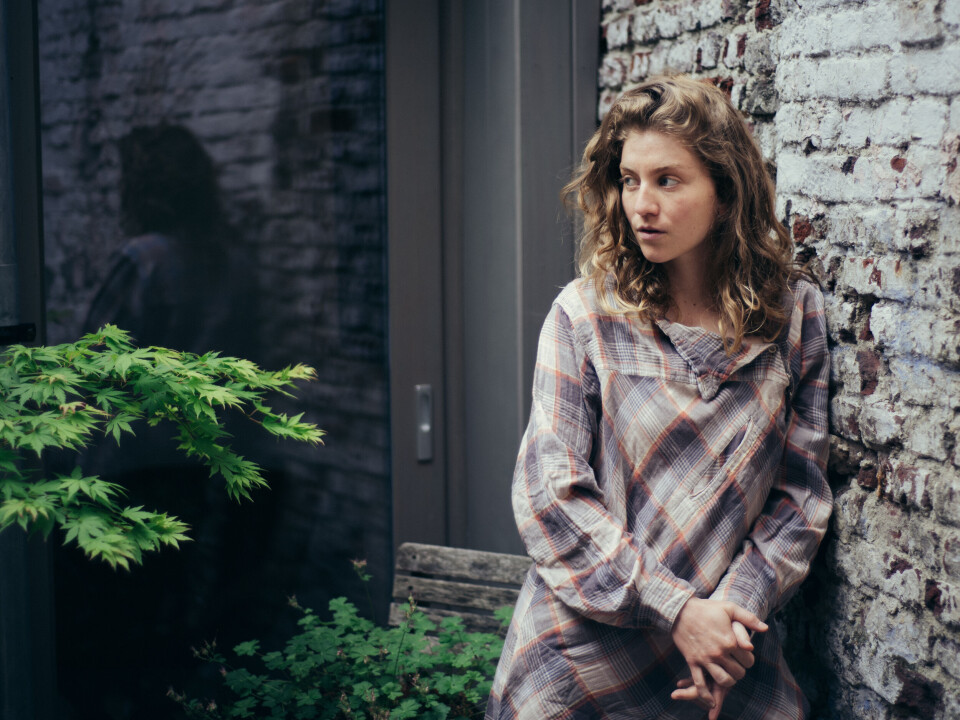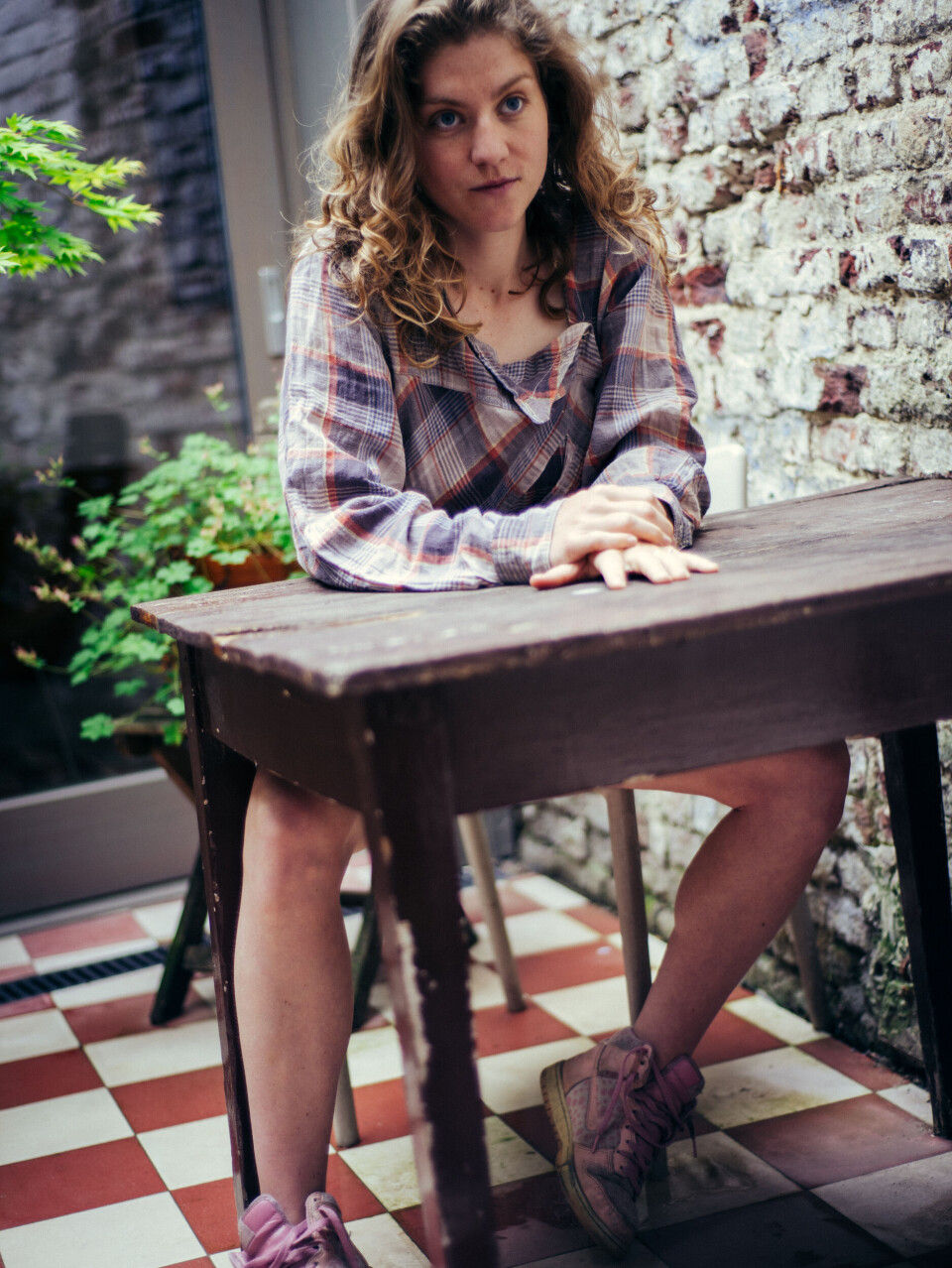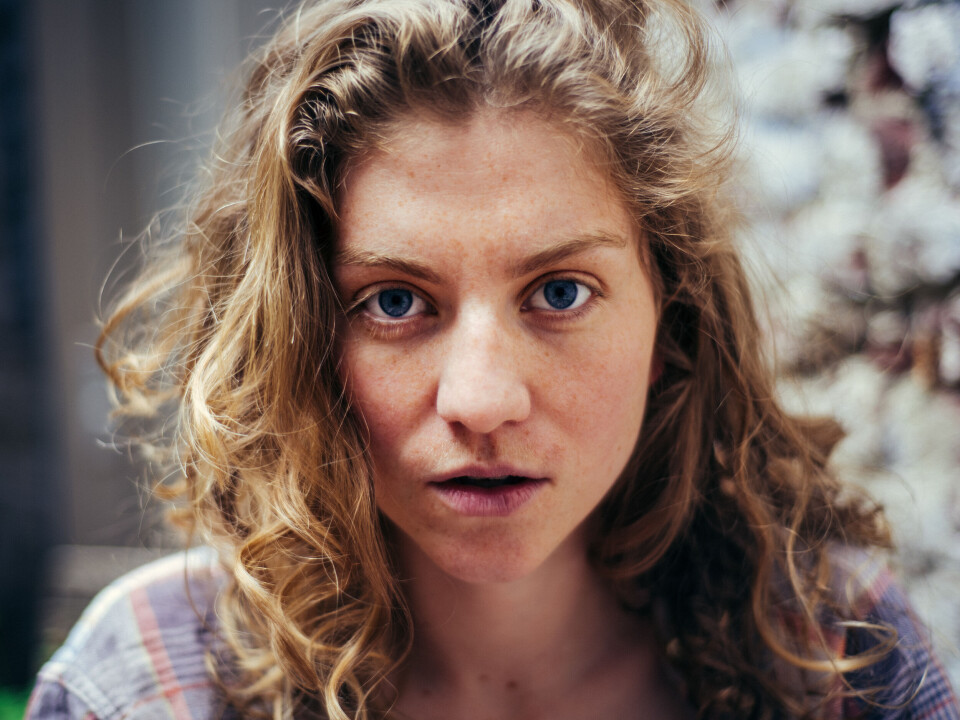INTERVIEW CHARLOTTE DE BRUYNE

'Overly sad characters are not fun to watch'
Charlotte De Bruyne puts on a touching rendition as Eva in Veerle Baetens' directorial debut When It Melts, a movie about (lost) innocence and betrayal. 'When It Melts is a plea to listen and pay attention to each other.'
In October, When It Melts (Het Smelt in Dutch), the cinematic adaptation of Lize Spit's eponymous debut novel, aired in Belgian cinemas. Debut director Veerle Baetens found her main character Eva in actress Charlotte de Bruyne. When It Melts compels viewers to watch as young, vulnerable Eva grows into her fragile, isolated adult self. Main character Charlotte de Bruyne looks back on the process of shooting the film as well as her experience premièring in the US and collaborating with debuting director Veerle Baetens.
Which message did you and Veerle Baetens try to convey with the film?
De Bruyne: 'When It Melts is a plea to listen and pay attention to each other. The film tells the story of a person, Eva, who is overlooked by the people in her environment. It does not provide instructions as to what people like her should do. Eva should not have spoken up, the people surrounding her should have paid attention and listened to her!'
'The film attempts to convey a powerful message. I hope it can activate its audience. Watch it, do not ignore it, talk to each other about it. That should be the purpose of the movie.'
Is such an angle uncommon for movies within the same category?
'Trauma and revenge are much-covered topics in film. A good film on the topic succeeds in portraying powerful main characters. To achieve that for the main character Eva proved to be the biggest challenge for me.'
'Overly sad characters are not fun to watch. Eva needed something powerful. There have to be elements that make the audience want to continue watching, that make you love Eva and think: "I'm rooting for you."'
'Veerle immediately noticed when I was acting too much like myself and not Eva'
'Kill Bill has been a big inspiration for Veerle and me. In that film, the main character has some sort of superhero quality. Veerle and I consider Eva's superhero moment to be the scenes in which she sits in her car with a powerful look in her eyes.'
'When It Melts is not the first film to bring forward the message "take care of each other", however, what is unique is the way in which this is brought about.'
Did you audition for the role or were you asked to play Eva?
Two years prior to the start of shooting, I sent a video in light of a general casting call I had come across. Much later on, I suddenly got a phone call from Veerle. Rosa Marchant had already been cast as young Eva, and Veerle was looking for lookalikes to play older Eva.
'When Rosa and I saw each other for the first time, we were both very impressed. This was really a match. Of course, Veerle also thought I was a good actress, otherwise she would not have worked with me.'
Did you have a say as to how the role of Eva would be shaped?
'I mostly followed Veerle's directions because they made sense. The script had been refined down to the last detail; Veerle knew what she wanted. We did work together to find out how the Eva's character could be developed further. We spent a weekend together, watched films, rehearsed, looked for character costumes…'
'Eva's coat, for example, plays an important role in the film. She could disappear in it, making the character even smaller, but also cooler at the same time.'
'As a director, you have to push children to a really dark place to put on intense performances'
'What are Eva's interests? What did her apartment look like? That is how Veerle came up with Eva's fascination for Southeast Asian countries. If you watch closely, you notice the Japanese accessories in her apartment, the noodle dinner...'
'For a long time, we were unsure about what Eva's job should be. Initially, she was a teacher, but we abandoned that idea. Teaching would've been too much of a social profession for Eva; there's too much talking involved. We also considered making her a photographer, but that was too strong of a profession. Thus, we ended up with a humble assistent photographer of a not-so-good photographer. (laughs)'
Did you read the book before shooting the film?
'"Yes, yes, I read it!", I told Veerle when she called me for the first time. I went to get the book later that day. (laughs)'
Did that help you interpret the role of Eva?
'I read the book as an addition to the script. Not with the intention to shape Eva; Veerle already did that. She then decided what should and should not be integrated into the script.'
Are there any apparent differences between the book and the movie?
'There have been lengthy discussions about the end of the film: how does it end? What should be the last shot of the movie? What do you want to convey with the ending? Do you want to leave Eva all by herself?'
'Eva's speech during Jan's commemoration was added to the story by Veerle. In the book, she doesn't even get a podium; she is even lonelier and sadder than in the movie. She is just completely alone.'
What did you think of the book?
'When It Melts is an incredibly strong debut. It is quite hefty, still, I read through its five hundred pages easily. I think it takes strong writing skills to write such a page turner. To integrate that same suspense into the film was the biggest challenge for Veerle.'
It is not self-evident for an actress to do so with that little text.
'I really underestimated that. The majority of Eva's communication in the film is nonverbal.'

'Veerle immediately noticed when I was acting too much like myself and not Eva. Even for a simple car scene, I really had to go deep to sit behind the wheel as Eva instead of Charlotte.'
'The scene I am proudest of is the scene in the butcher's shop. That is such a strong and confronting scene, because everything is in the characters' looks. Everyone looks at each other, there is so much to say, yet nothing is said. The only thing spoken out loud is the 200g luncheon meat order.'
Do you think it's a pity that some storylines in the book did not make it onto the screen?
'I think the storyline of Eva's sister Tesje is a very powerful one in the book, but films have less time and space to develop storylines. Thus, Veerle decided to focus on Eva. As a result, the film's suspense becomes almost unbearable. If you would take that focus away, the viewer would experience a break from the main character. Veerle wanted to avoid that.'
The movie has already been shown internationally. How did the first screening at the US Sundance Festival go?
'I thought it was a great honour to be there. The big difference between an international and a Flemish audience is that the book no longer served as reference material in the US. It was nice to see that the audience did not need to know the book to be able to like the movie.'
'The most beautiful thing that can happen would be for the film to start a conversation'
'During the first screening, Rosa and I were seated in the back of the theatre, hands clenched. The room was dead silent. Not from boredom, but from pure focus.'
'Despite the prominence of Flemish culture in the film, When It Melts has managed to catch on with an international audience. The funfair or the butcher's shop are very familiar to a Flemish audience, and can therefore also be confronting to those viewers. Still, the story appears to be a universal one, which is nice to hear.'
The film aired in Belgian cinemas on 25 October. What kind of reactions do you expect from the public?
'I'm really curious. I think the film may hit hard for some. I expect reactions to be intense.'
'The most beautiful thing that can happen would be for the film to start a conversation. At Onroerend Goed, the theatre company I work with, we always try to produce performances that provoke discussion in the foyer afterwards. I think When It Melts could have that same effect. That is my greatest hope.'
When It Melts is Baetens' directorial debut. Was it apparent that she had less experience than the other directors you worked with?
'While Veerle was still exploring her role as a debuting director, she knew what she wanted. She decided, "I am the director", seized the opportunity with both hands and just went for it. I really look up to that.'
'It is important to draw a line between my personality and the character's'
'I have worked with delightful directors, however, Veerle is the best actor-director I have worked with up until now. Largely because I do not often work with a director in this way. My role in When It Melts is an emotional one with a lot of character depth. I have never gone that deep, that far from myself, for a role.'
How did Baetens deal with the intensity of When It Melts when it came to the child actors?
'As a director, you have to push children to a really dark place to put on such intense performances, but Veerle dealt with that brilliantly and really took her time directing them. She worked with those kids for a year and half. As such, the children knew each other very well and felt comfortable around each other.'
'A psychologist was present during emotionally tough scenes, also, on-set communication was great. The crew was very warm-hearted. It is important to create a dynamic in which children feel like they can express how they feel. You get to know each other and learn to notice whether someone is feeling good or not.'

Can you distance yourself from your character after a day of shooting?
'That requires time, some sort of decompression time. I have not yet figured out the best way to step away from the shooting process. That can sometimes be very difficult.'
'A psychologist recently said: "The things actors do with their minds are incredible. They push themselves to experience intense emotions constantly, but do not give themselves space to process those emotions because they are allegedly not theirs."'
Is there something in the film you would have wanted to change? A specific scene or character, for example?
'Veerle has shown us the movie in its unfinished state a few times, asking for our opinions. She took them into consideration during the last phase of montaging. I do not remember what we said or if she listened to us – that is not important anyway. I think the movie became exactly like it should.'
What do you take away from this production?
'I have learned a lot. Ever since When It Melts, I prepare differently for acting roles. I like to think about my characters beyond the script. Who is my character? What does their life look like? What are their interests?'
'Aside from that, I also learned to set boundaries between myself and my characters. When I play a role similar to myself, it is important to draw a line between my personality and the character's. I delineate those distinctions beforehand. I believe I am a better actress for that.'
What does the future have in store for you? What are you working on at the moment?
'When it comes to film and television, I have no running projects, except for the VRT series Juliet which will be released soon. In the coming months, all my attention will be directed towards Onroerend Goed's new theatre project. From next month onwards, Onroerend Goed will produce a new performance for NTGent, where we are artists in residence. A tour in Australia is on the agenda for January.'









